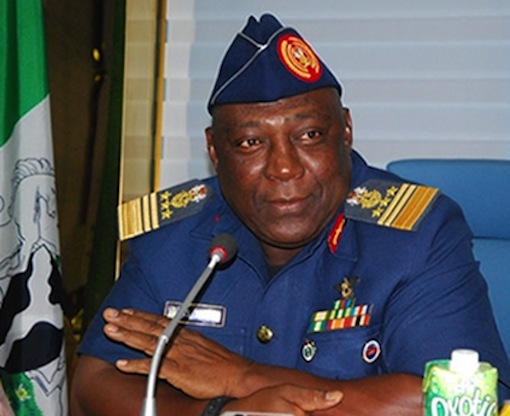
Insecurity is still an issue. The jolting killing of former Chief of Defence Staff (CDC) Air Chief Marshal Alex Badeh drove the point home. A statement by the Nigerian Air Force (NAF) Director of Public Relations and Information, Air Commodore Ibikunle Daramola, said Badeh died on December 18 “from gunshot wounds sustained when his vehicle was attacked while returning from his farm on Abuja-Keffi Road.” Reports described the area as a robbery and kidnapping black spot.
Two others were said to have been in the vehicle when the attack happened: Badeh’s friend and his driver. A police statement said “his driver was injured and the said friend abducted.”
As expected, the military and the police have launched an investigation into the killing. The NAF denied the allegation that adequate security was not provided for the dead Air Chief Marshal. The NAF declared: “Air Chief Marshal Badeh has always been provided with the full complement of personal staff and security personnel commensurate with his status as a former Chief of the Air Staff (CAS), CDS and a four-star general in the Armed Forces.” However, the extent of Badeh’s protection when he was attacked is another issue entirely. The investigation must identify the killers and bring them to justice. Also, the abductee must be rescued.
It is an intriguing coincidence that Badeh was killed about a month to the opening of his defence regarding an alleged fraud involving N3.97billion. The Economic and Financial Crimes Commission (EFCC) in 2016 accused Badeh of financial misappropriation during his tenure as service chief. Badeh claimed he was innocent. The court had fixed January 16, 2019 for his defence after his application for a no-case submission failed. Badeh’s case is an example of how insecurity affects even the Federal Government’s anti-corruption efforts.
It is disturbing that insecurity prevails. It isn’t an exaggeration to say that the casualties are incalculable. Sadly, there are justifiable fears that insecurity will escalate with the approach of the general election next year.
It is noteworthy that the International Republican Institute and the National Democratic Institute drew attention to the climate of insecurity in the country and how this could affect the coming elections.
The two international organisations said after a recent pre-election assessment: ”The 2019 elections will be conducted in an environment of insecurity in some parts of the country. Recent attacks in the North East have raised concerns about Boko Haram’s resurgence. In the Middle Belt, inter-communal violence continues, while criminality and gang violence across the country, particularly in the South South, is on the rise.” They emphasised that “if insecurity persists or increases, this could deter citizens from participating in the electoral process, including voting on election day.”
A troubling report by Amnesty International (AI) Nigeria released on December 17 also highlighted insecurity. The report was titled: ”Harvest of death: three years of bloody clashes between herders and farmers.” AI’s Country Director Osai Ojigho said at least 3,641 people were killed between January 2016 and October 2018, 57 per cent of them in 2018 alone. According to her, “AI visited 56 communities in Adamawa, Benue, Kaduna, Taraba and Zamfara states affected by the clashes and conducted 262 interviews, including remotely with members of communities in Nasarawa and Plateau states.”
There will be negative reports if there are negative happenings. For instance, in the last two weeks, about 40 persons were killed and 1,700 displaced in Tsafe local government area of Zamfara State, according to the council chairman, Alhaji Aliyu Abubakar. The number of fatalities and refugees is a result of the activities of suspected armed bandits and cattle rustlers in the area.
Almost on a daily basis, there is news that reflects insecurity. The Badeh killing is a further call to action. The authorities must act to further strengthen the country’s security architecture.
END

Be the first to comment